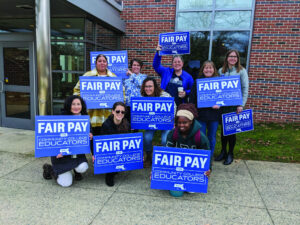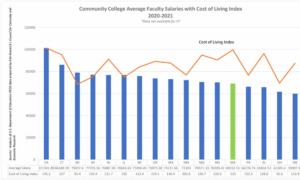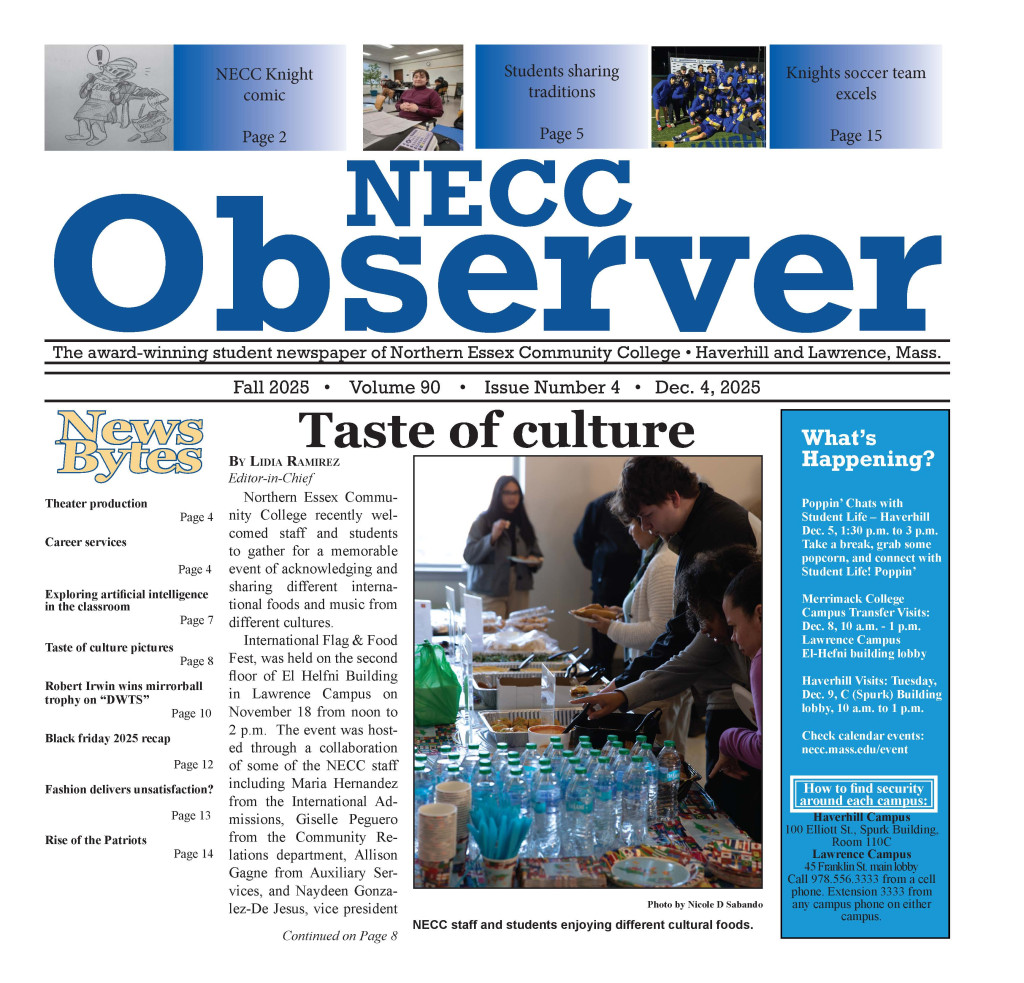
Professors and staff are under “Work to Rule,” as of press time for the Observer, on Tuesday, Nov. 14.
They say they are protesting being underpaid, not receiving a raise since 2021 and currently working without a contract.
Faculty and staff members of the Massachusetts Community College Council – MCCC Union held signs that read “Work to Rule” on Nov. 1 at President Lane Glenn’s pizza meeting, in front of the TC building at the Haverhill campus. A similar group stood under the rain, in front of the Dimitry building on the Lawrence campus on Nov. 9.
What is Work to Rule
Faculty and staff members of the MCCC Union are not allowed to strike.
“We are stuck. All we can do is Work to Rule,” said English Professor Tom Greene, who is the day grievance coordinator for the NECC union.
Work to Rule means that they will follow only what is in their job descriptions, which is, besides teaching and grading students’ papers, working according to their office hours, advising assigned students and attending some meetings.
Any email or students’ questions after hours, or their participation in events or committees as volunteer advisers or mentors would be avoided. These extra tasks are done voluntarily as they work above and beyond on behalf of students. They have adopted this measure since Oct. 24.
They have also held informational pickets, which they hope will help to draw the legislators’ attention to find a solution to their problems.
“Our hope through Work to Rule is to not hurt the students because it’s not the student’s fault that we’re in this predicament,” said English Professor Patricia Portanova, the vice president of the NECC union.
Why are faculty and staff “stuck”
“I think the public doesn’t know that we’re so poorly paid. I would hope that the public would support a fair wage for their educators,” stated Portanova.
Most of the faculty and staff at NECC and 14 other community colleges across the state are part of the MCCC Union.
The board of the union and the board of Higher Education negotiate raises and contracts. The governor submits a proposed budget to the state Legislature. That needs to be ratified by legislators, it must be approved by both the House and Senate, when the money should then be distributed to faculty and staff through their paychecks.
On Nov 9, the House of Representatives sent the supplemental budget with the MCCC contract to the Senate for passage. The Senate passed it the evening of Nov. 14, however there is a disagreement between the House and Senate about funding for the state’s emergency shelter system so the supplemental budget was not sent back to the governor by Wednesday, the last scheduled meeting day for the Legislature before their holiday break. It’s unclear when the supplemental budget will now be sent to the governor, as the Legislature is not scheduled to meet again until January.
Glenn, NECC president, told the Observer he has communicated with legislators to encourage them to pass the budget.
On Nov. 16 he sent an email to faculty and staff that said he and the other college presidents have all sent formal entreaties to legislators urging them to address the issue.
He said that since the contract funding is included in the budget but that it could be 2024 before the bill is passed, they are moving forward to pay the new pay rates and COVID bonuses in the Dec. 8 payroll and retroactive payments in the Dec. 22 payroll.
This contract, 2021-2023, has been negotiated since 2021 with an increase of 2%, until last February when it was approved, but had already expired last June. Community college faculty and staff have been waiting for retroactive pay for those raises from 2021 and 2022.
In addition to that, “we started negotiating our 2023 contract over the summer and already the state has not put together a strong negotiating team. So, we’re already behind on negotiating our next contract,” explained Portanova. Faculty and staff are working without a contract at this moment.
“However, we have worked many, many years without a contract,” emphasized Business Professor Sheila Muller.
On top of it, “we are still waiting for a COVID bonus of $1,500” noted English Professor Ginger Hurajt.

Community college faculty salary far below the cost of living in Massachusetts
Beyond the painstakingly slow process of getting paid late, faculty and staff in community colleges in Massachusetts are paid lower salaries than their counterparts in some other states, when the cost of living is taken into account.
As the cost of living in Massachusetts has skyrocketed in the last 10 years, including inflation, the 2% raise does not keep pace with the basic expenses of living in this area. According to the MCCC – NECC chapter, “other higher education unions in Massachusetts have been offered, and accepted, an 8% per year annual raise – including some members of other unions at NECC. The MCCC union was the only state higher education union that was not included in the 8% offer.”
The chart with this article shows the cost-of-living index in Massachusetts is $133,000 (red), while the average salary for community college faculty, $69,152 (green). Living in Massachusetts is nearly as expensive as living in California, $135,000 (first blue left), with the big difference that California faculty wage surpasses $101,000, over 46% more than their colleagues in Massachusetts.
State universities in Massachusetts have less workload and are paid significantly higher than their counterparts in community colleges with same credentials and experience, according to NECC faculty.
“UMass’es professors are making 30-40% more roughly than we make in community colleges. Our teaching load is 10 classes a year, their teaching load is between 5 to 7 classes a year. Most community colleges around the country are 8 classes a year. As a result, the important point is, because we cannot make ends meet on a base salary, most full-time professors take overload classes. For example, I have my base load of 10 classes, and I teach another 7 or 8 extra classes so I can make means to cover my expenses. The pay has been going down and down with inflation and the workload up and up to make up to the pay, and this hurts the students because if I have twice as many students, I have as much as half time to spend with them. If we would get paid a competitive wage, then we would be able to spend more time after class with our students,” stated Greene.
Difficulties in hiring new professionals and finding volunteers
Salaries are so low that it is a titanic job hiring for new positions or retaining new talent, according to NECC faculty.
Candidates either drop out of the hiring process as soon as they learn the salary, or they stay six months or a year until they find something else, Greene said. In addition, it is hard to find volunteers among faculty and staff as they have low morale due to low pay and being overbooked with lots of responsibilities around campus, he said.
MassReconnect
Without a doubt MassReconnect is a great opportunity that can benefit around 8,000 students across the 15 community colleges in Massachusetts.
MassReconnect allows students 25 and older without a college degree to attend community colleges for free.
However, Gov. Maura T. Healey should take into consideration the request of their educators.
Portanova said offering free college to a large percentage of our population “is a beautiful, amazing new initiative,” but she questioned “how are we supposed to invest in the success of those students if we’re not investing in faculty and staff who are there to support?”
In agreement with this concern, Muller stated, “If you’re going to bring more students, you also have to be able to serve equitably and humanely with the same accommodation for the faculty.”
Why are they staying?
Due to the unfair pay, faculty and staff are almost pushed to “live like Thoreau in Walden,” said professor Hurajt. Since 1998, however, she has loved teaching in NECC as there is support at every level, from courses through honors-level courses for students. Hurajt, MA, teaches English and is the Honors Program coordinator.
Portanova, MA, PhD, stated, “It’s probably the most rewarding job you could do because you get to serve others and you get to help others succeed in their goals and that’s such an amazing opportunity.”
Muller’s profile says that she takes pride in her students evolving into confident and self-reliant individuals. Her credentials include MBA, chair of Department of Business and Accounting, chair Executive Committee and All College Assembly.
“My dream is that the place where I am in, the place where I like to teach, the place that I really come to love in the last 15 years (NECC) would pay me the salary that I should get. That would be my dream. So I’m holding out hoping that the state come true, and trying to do everything that I can to encourage them to do that,” said Greene, MFA, PhD, chair of Department of English.
As of Nov. 16, the statewide union was urging members to attend a rally Nov. 17 at Bridgewater State and another at the State House on Nov. 20 to urge the legislators to pass the budget before Thanksgiving. They are also asking members and supporters to contact their legislators.
If you want to support your professor or staff in your community college, please visit this site: bit.ly/MCCCpetition23 and sign up for their petition “Fair Pay for Community College Educators.”

